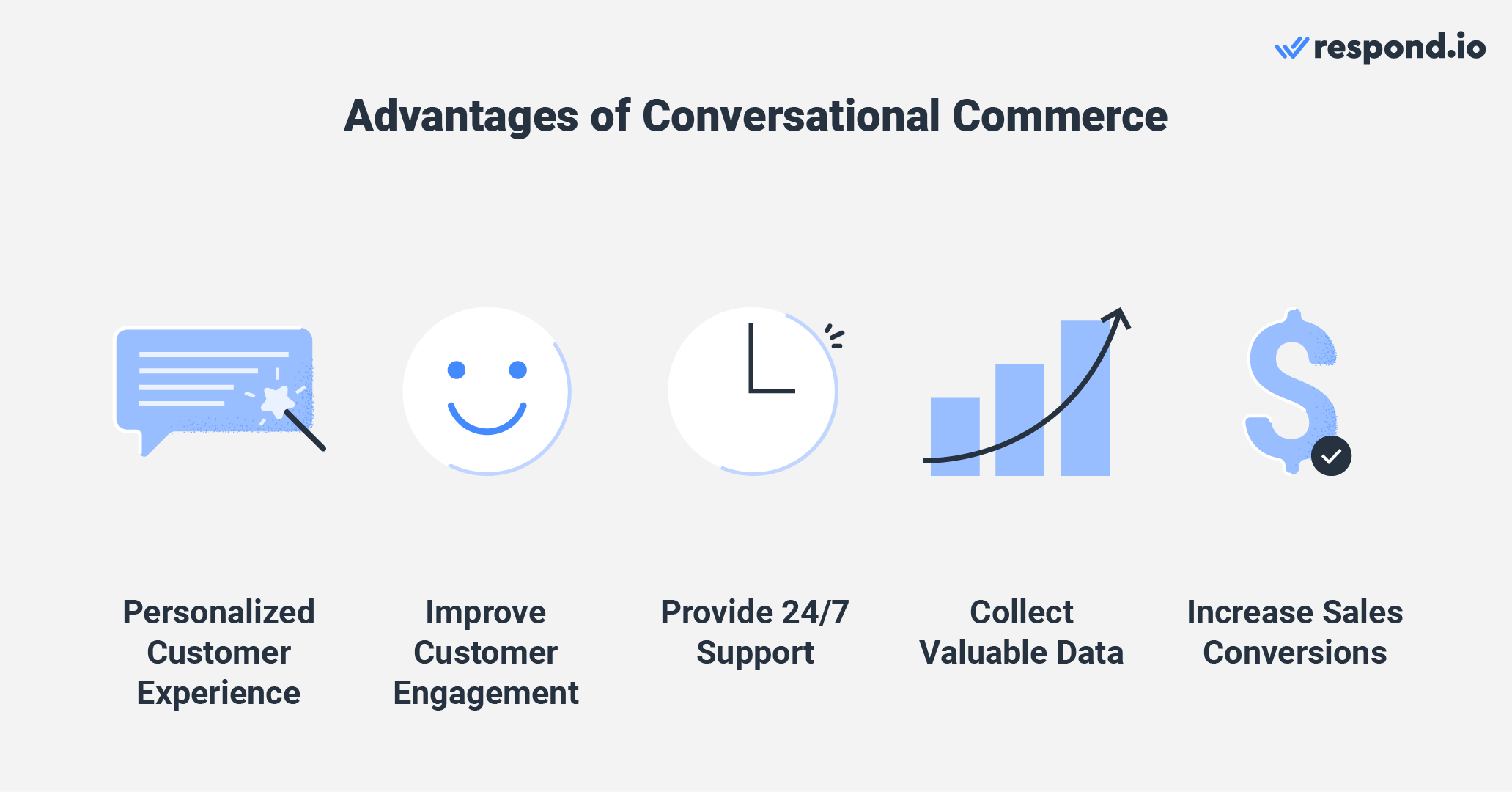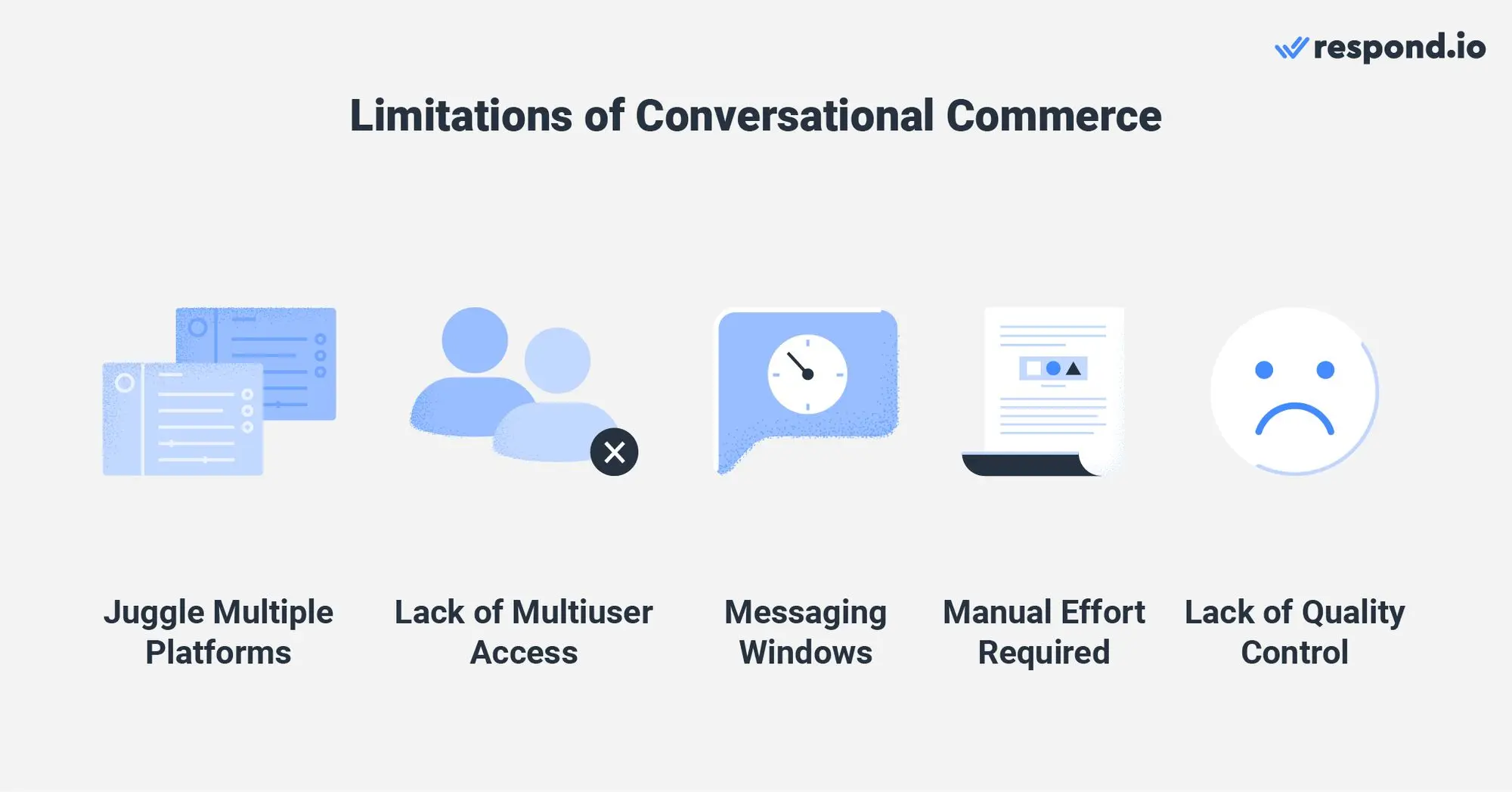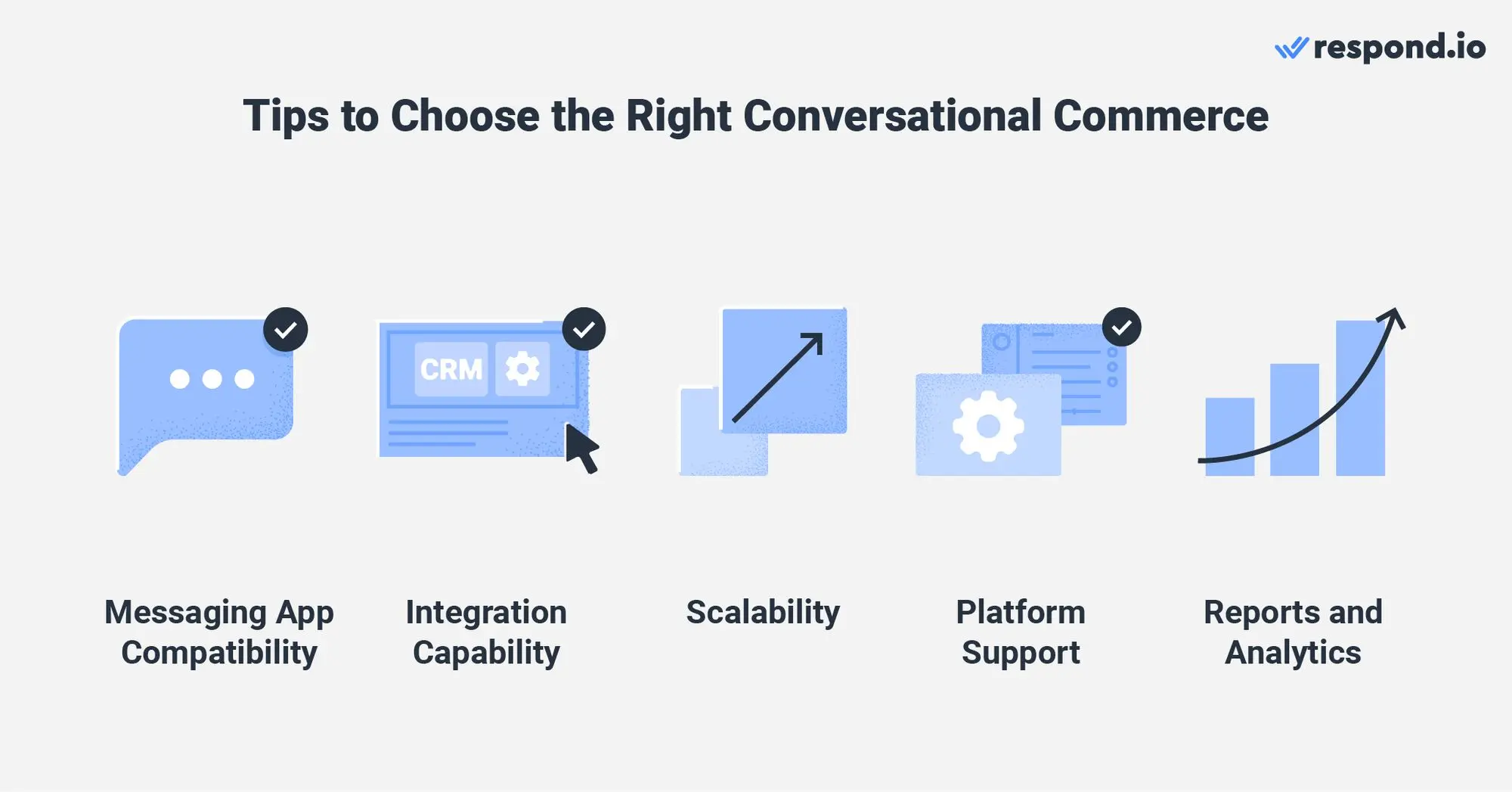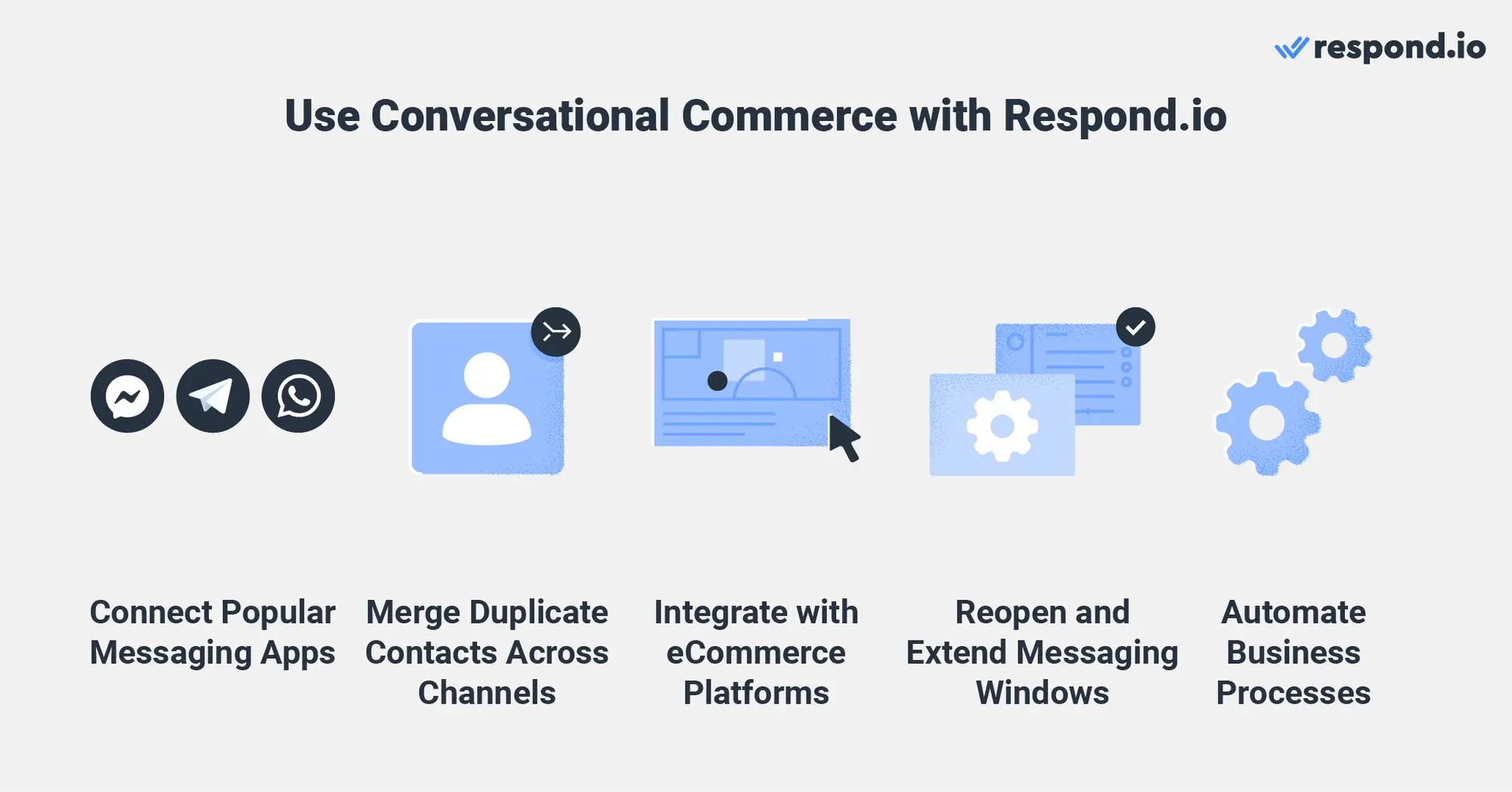
Want to know what conversational commerce is and how it can enhance engagement and the customer experience? In this article, we’ll explain what conversational commerce is and explore its benefits and challenges. Additionally, we’ll delve into how businesses are leveraging it, including their process for choosing the right channels. Furthermore, we will explore how to enhance customer engagement with the help of a conversational commerce platform like respond.io.
What is Conversational Commerce?
Conversational commerce is a way for businesses to create a smooth and hassle-free shopping experience for customers by merging e-commerce with messaging apps.
Here, customers can engage in conversational and personalized interactions with businesses in real time. They can make product inquiries, get customized recommendations and complete their orders.
Benefits of Using a Conversational Commerce Platform
Conversational commerce offers various benefits for businesses in any industry. Let’s go through them here.
Personalization: Conversational commerce can be tailored to individual customer needs and preferences, providing a more personalized shopping experience.
Improve customer engagement: Businesses can leverage popular messaging channels to connect and build rapport with customers. This makes customers feel valued, resulting in a positive experience that encourages repeat business and referrals.
Provide 24/7 support: It can provide faster and more efficient customer support as compared to traditional channels like email.
Data collection: Conversational commerce can provide businesses with valuable data about customer preferences, behaviors and buying habits, which can be used to improve marketing and product development.
Increase sales conversions: Understanding customers and providing personalized recommendations and quick assistance can increase sales conversions and revenue.

After examining the key benefits, it's important to also consider its limitations, which we will explore next.
Challenges of Conversational Commerce
Despite its advantages, conversational commerce also has some limitations that businesses should consider. These potential drawbacks include:
Juggling multiple messaging platforms: Businesses may have to manage conversations on different platforms such as WhatsApp, Facebook Messenger, live chat and more. This can be challenging for small businesses as the lack of manpower may result in inconsistent service or delayed response times.
Lack of multiuser access: Some messaging platforms, such as WhatsApp Business App, limit the number of users so businesses struggle to handle a high volume of inquiries and respond promptly.
Messaging windows: Channels like WhatsApp API and Facebook Messenger impose 24-hour messaging windows and businesses might not be able to respond within the allotted time.
Manual effort required: If agents are chatting with customers on multiple platforms, manually routing inquiries to the right team can be time-consuming. This can lead to delays in response time and frustrated customers.
Lack of quality control: Businesses often struggle to monitor the quality of conversations and agent performance when they’re using multiple platforms or personal apps.

With the right strategies and tools, businesses can overcome these challenges and make the most out of conversational commerce. Next, we'll explore how the respond.io platform can help businesses streamline their conversational commerce efforts.
Turn customer conversations into business growth with respond.io. ✨
Manage calls, chats and emails in one place!
How 3 Businesses are Winning at Conversational Commerce
Here, we’ll share some real-life examples of how businesses are leveraging conversational commerce to enhance customer engagement, drive sales and provide better support to their customers.
Crew Clothing
Crew Clothing used Facebook Messenger to automate Christmas recommendations for their customers. Almost 50% of the conversations triggered by ads resulted in purchases, and the campaign delivered a 5X return on ad spend.
Maggi
Maggi created a WhatsApp campaign in which a digital assistant answered users' cooking-related questions and provided personalized advice. The campaign sent 200,000 messages in the first eight weeks. It also delivered a 4.2-point upturn in standard ad recall and a 3-point lift in campaign awareness.
Lamarsa Coffee
Lamarsa Coffee was struggling to manage a flood of sales, orders and after-sales inquiries over multiple messaging channels. It used respond.io to centralize omnichannel communication and assigned customers to the right agent with tailored routing strategies.
Lamarsa Coffee improved response times by 38%, leading to a 50% increase in sales in less than a year.

It’s clear that businesses are reaping the benefits. However, in order to fully capitalize on this, they have to choose the right platform for their business needs. Let’s find out how in the next section.
How to Choose the Right Conversational Commerce Platform
When choosing a conversational commerce platform businesses should consider a few factors. To get started, you first need to identify which messaging apps are popular among your target audience or region of business.
Channels like WhatsApp and Facebook Messenger, used by billions worldwide, are great choices to reach a wider market.
In addition to that, you should consider the channel's features and verify if the platform supports your messaging strategy. For instance, not all platforms support WhatsApp, LINE and Viber broadcasts in their plans.
You should also opt for a platform that can easily integrate with the systems that you’re already using, such as your CRMs, to ensure that you can streamline data sharing and provide a cohesive customer experience.
Then, you should look at the platform’s scalability. If your business is growing, you need a platform that can support a high number of agents and handle high volumes of conversations without any downtime so you don’t miss any potential sales opportunities.

For larger companies, having access to technical support, resources and dedicated managers is vital to maintaining smooth operations and ensuring a seamless customer experience.
The platform’s analytics and reporting module is crucial for optimizing your strategy. With good visibility into team performance and customer conversations, businesses can make informed decisions for improvement.
By evaluating the aforementioned points, businesses can choose the platform that best meets their needs and enables them to provide the best customer experience. Next, we’ll explore five ways that businesses can use conversational commerce with respond.io.
Conversational Commerce with Respond.io: 5 Quick Wins
In the following section, we will learn how respond.io can be used by businesses to enhance customer engagement.
A key benefit that respond.io offers is its omnichannel capability. Businesses can connect WhatsApp, Facebook Messenger, LINE, Viber, Telegram and even custom channels. This centralizes all channels so agents can manage all conversations from one place.
Respond.io’s Contact Merge feature gives businesses a holistic view of their customers. This helps businesses to identify returning customers, even if they message from different channels, so they can better understand their needs and preferences.
Integration with e-commerce platforms like Shopify and WooCommerce is also possible. This enables businesses to leverage conversational commerce to increase sales and conversions.

Moreover, respond.io allows businesses to reopen messaging windows on channels like WhatsApp or Facebook with Template Messages and Message Tags respectively, which makes it easier to proactively message or re-engage with customers and drive sales.
Respond.io’s Human Agent Tag for Facebook Messenger and Instagram also allows businesses to extend messaging windows to 7 days, providing more time to connect with customers and resolve complex issues.
Businesses can automate pre-chat surveys using Workflows automation. Using customers’ answers, they can apply customizable routing logic, such as prioritizing VIP customers or routing by location or language, then assigning them to the right agent. This helps to improve response times and in turn, customer satisfaction.
In conclusion, conversational commerce is a powerful tool that allows businesses to engage with their customers. By leveraging different messaging apps, businesses can provide personalized customer experience.
Looking for a conversational commerce platform to take your business to the next level? Try respond.io for free!
Turn customer conversations into business growth with respond.io. ✨
Manage calls, chats and emails in one place!
Further Reading
Want to learn more about how businesses are using conversational commerce? Check out our success stories:






































 Electronics
Electronics Fashion & Apparel
Fashion & Apparel Furniture
Furniture Jewelry and Watches
Jewelry and Watches
 Afterschool Activities
Afterschool Activities Sport & Fitness
Sport & Fitness
 Beauty Center
Beauty Center Dental Clinic
Dental Clinic Medical Clinic
Medical Clinic
 Home Cleaning & Maid Services
Home Cleaning & Maid Services Photography & Videography
Photography & Videography
 Car Dealership
Car Dealership
 Travel Agency & Tour Operator
Travel Agency & Tour Operator




